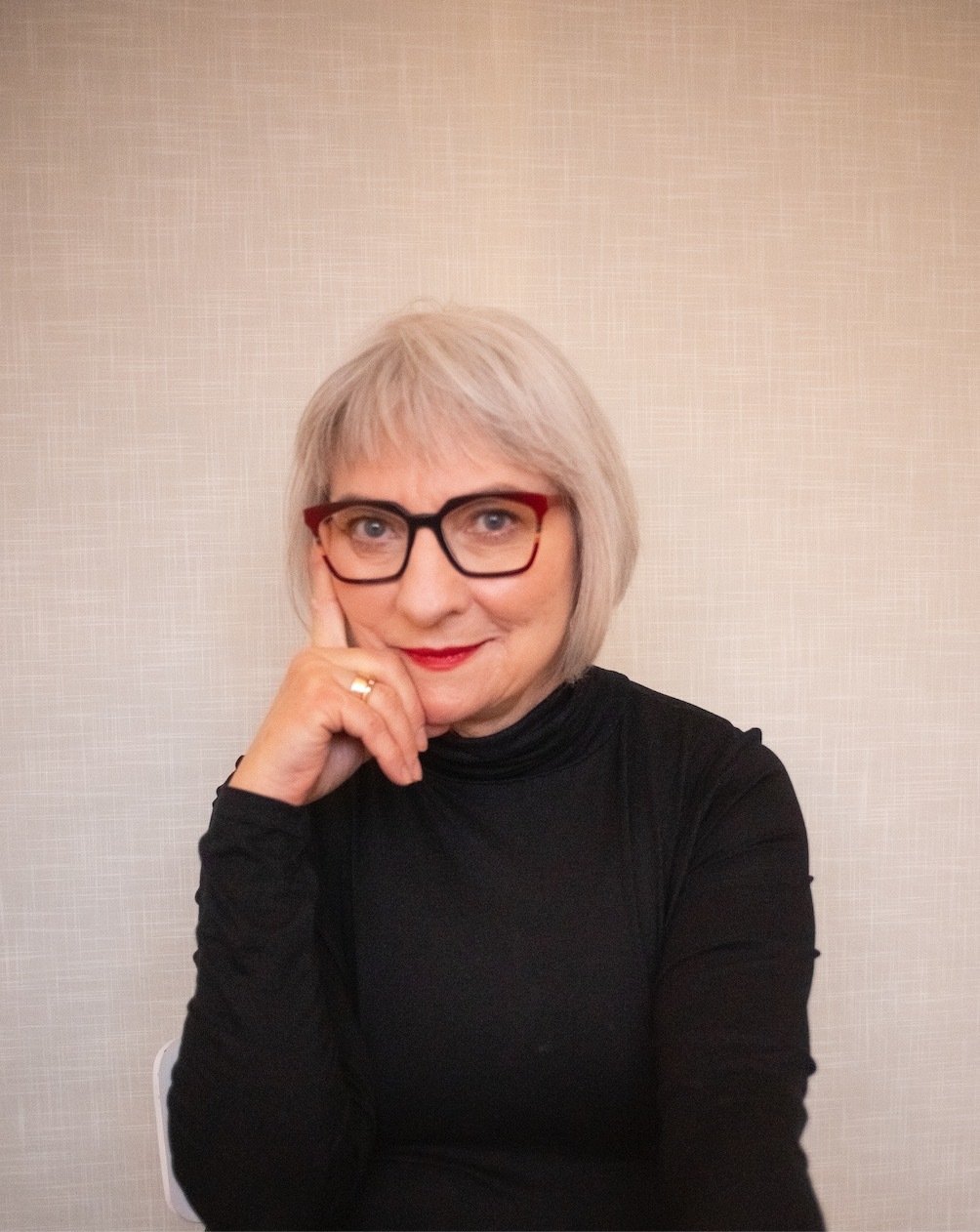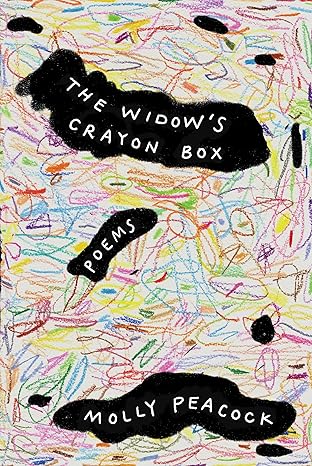 After her husband Michael Groden (1947 – 2021) died, Molly Peacock cried for twenty-eight days straight she says in Best Canadian Poetry 2025 in which one of her poems, “Honey Crisp” from her new collection, The Widow’s Crayon Box (W. W. Norton, 2024) appears.
After her husband Michael Groden (1947 – 2021) died, Molly Peacock cried for twenty-eight days straight she says in Best Canadian Poetry 2025 in which one of her poems, “Honey Crisp” from her new collection, The Widow’s Crayon Box (W. W. Norton, 2024) appears.
“On the twenty-ninth day, I woke without tears, picked up a blue mechanical pencil, and began to write the poems that would become The Widow’s Crayon Box. ‘Honey Crisp’ literally began when I walked to the refrigerator. There was my husband’s last apple – I couldn’t throw it out.”
Author Photo: Candice Ferreira
“A mourning widow is still, gray and mauve / A mourning widow, umber, barely moves,” Molly writes in the title poem “The Widow’s Crayon Box.”
The eight child-colors of Crayola boxes
are far too basic and behaved – I feel
the one-fifty-two emotional shades:
a rose one fleurs before a peach one fades.
Scarlet, orchid, cerise umbrellas shield
me from my own tears.
Then I yield.
(The colours not in italics are of past or present Crayola crayons.
Each section in the sixteen-part sonnet sequence, leads with a phrase or a complete line from the previous sonnet so that part 2 begins: “I yield to a turquoise sky.” It’s a very satisfying structure and helps to illustrate this widow’s ongoingness through the many colours of emotions, difficult as well as those that are surprising.
Some quirky humour emerges as the speaker remembers and misses her late husband, as well as with the poignancy of practicalities.
Getting rid of your clothes? Pure fantasy.
I pluck out thirty-eight pairs of socks and lay
them on the table – stripes and checks, a combo
of Crayola colors: “mango-tango,”
“radical red,” “purple heart,” and “shadow,”
once paired with Asics, now part of your myth.
The poem ends with:
raw magic below the cloud’s scrim (her/him)
casting a shadowlet of knowing
across a window: still, gray and mauve. Morning.
(The cross-out of “him” is intentional. Asics are a brand of running/walking shoes.)
The book is in four movements beginning with “After.” Part Two is “Before” with poems about hospitalization such as “Notes from Sick Rooms.” The poem takes its title from Julia Prinsep Stephen’s Notes from Sick Rooms, 1883. There are quotes from her daughter Virginia Woolf as well, particularly her work On Being Ill, 1930.
The speaker in the poem finds “love and illness mixed” to be an irritating challenge and remembers, besides caring for her husband, her sister “Born ill, a preemie after the War . . .
As her husband’s primary caregiver, the speaker says:
. . . and at 7pm I’d love-hate you most,
the exact time I had to deliver
dinner on your drug trial – timing those roast
fucking parsnips . . . that was the love-cleaver.
A caregiver really is a mother.
And at the beginning of the next section:
A caregiver really is a mother.
How exhausting it is to mix the roles up.
Couldn’t I ever just be a lover?
Molly is so honest in her poems about the resentment caregivers feel but rarely mention. In “A Tiny Mental Flash on a Red Footstool,” the resentment is reversed.
My energized posture has grown to annoy him.
Caregiving comes to this.
While masturbation is “the widow’s sex” as Molly writes in “The Widow’s Crayon Box,” in “Sex After Seventy,” there may be some literal closet cleaning going on as well as the metaphoric closet of memory. Here are the last three lines:
as a long surprise of a spring afternoon arrived
through the threshold of that closet
on a spare bed we’d been saving all our lives.
Part Three, “When” has poems such as “Deciding to End Your Life, You Thank Me” which is about MAID: Medical Assistance in Dying. Another poem, “The Next World is One of Ideas,” also references MAID. Here are the last lines:
Have you received thoughts
And wondered why they’ve not
Occurred to you before?
They could be his
In “My Next Husband is Solitude,” the speaker doesn’t plan on another husband following the death of her current one.
What if you let solitude be next for me,
your ghost on a bench overlooking
my blue austerity.
In Part Four, “Afterglow,” in a poem titled “The Afterglow,” the speaker says:
Now I live in the afterglow
Purple and peach streaks
Behind the near-night clouds.
The collection ends with “Honey Crisp” in which the speaker reflects on “that man hewed to his routines: / an apple for lunch every day” as she speaks to the apple “almost a year old” that becomes “a red angel.”
The poem begins “Hello wizenface” and ends:
Hello soft wrinkled
face in my palms.
Molly and Michael were married for twenty-eight years, beginning as high school sweethearts who broke up due to the distance between their two colleges. Two decades later, they reconnected, each having been married to other people – marrying them in the same year and divorcing them in the same year (as one another).
Michael became an internationally known James Joyce scholar and distinguished professor of English at Western University. “Over the years, his work inspired me to research and write two biographies as well as my poetry, and my creative life inspired him to write a memoir as well as pursue his scholarship. Together we were a team in every way, including sports – the badminton Fred and Ginger of our gym,” Molly wrote in an opinion piece for The Globe and Mail (November 16, 2024).
In the opinion piece, “The Virtues of Losing It,” Molly writes about “losing it” with anger at a neighbour who blew a fuse while vacuuming and at a bank manager’s instructions. Poor “bewildered” kid at the farmers’ market who couldn’t make change at whom Molly “outright yelled”!
She rarely loses it now, three-and-a half years into widowhood. Nowadays, she finds herself “very much connected to the 16-year-old who met my late husband.”
“And really, rather than losing it, I lost him – and to my surprise found a younger self that I’d abandoned.” Molly tends to have a crowded schedule that she “mostly” thrives on. And as she says of calmer moments, luxuriating “in bed with a morning tea, my weekly sonnet practice turned into a whole book of poetry.”
The Widow’s Crayon Box is a powerful and passionate expression of grief and the many aspects of it. Molly Peacock says she has found a “resting calm” she never thought she’d achieve on her own without her husband


Mary Ann, I opened “The Analyst” last night and read
the poem “dream Strawberry”, with your name printed below.
on page 58.
love her work. Thank you.
Ann.
What a lovely tribute to what sounds like a remarkable book. Thanks for introducing me to her poetry. I love the title and images of the different colours that are woven through each poem.